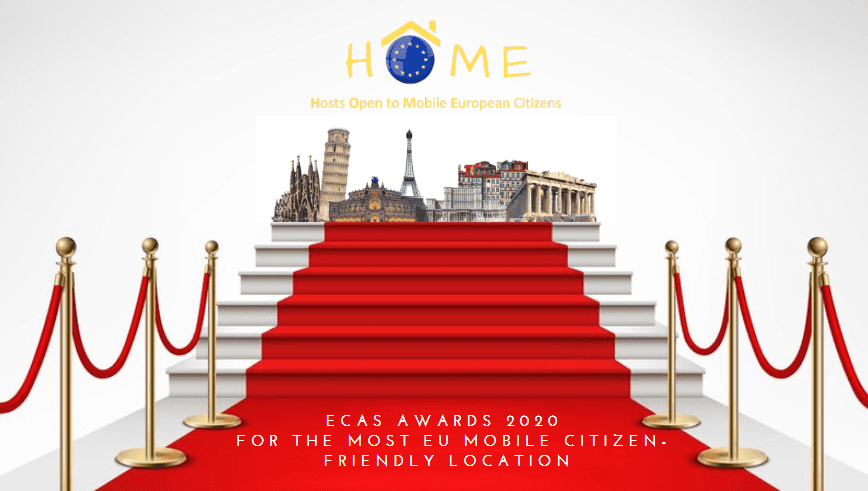
*Please note, the voting phase has now been closed. We will announce the winners at the ECAS State of the Union Citizens’ Rights Conference, taking place online January 21-22, 2021!
We are excited to open up the vote for the “Most EU Mobile Citizen-Friendly Location”!
The competition is rolling out the red carpet to nine EU cities’ and organisations’ initiatives that enhance EU freedom of movement and foster the inclusion of mobile EU citizens.
Below, you will find the details of the participating initiatives.. Once viewed, please submit your vote for your favorite one in each category!

Initiative name: Lets talk it out!
Location of Volonteurope (initiator): Brussels, Belgium
Description: Jumping into the unknown usually happens after graduating, not while still studying! But the Covid-19 epidemic did exactly that for students and organisations involved in the Erasmus+ programme.
Launching the first of a series of podcasts, Volonteurope Vice President Constantin Dedu talks through some of the uncertainties. He provides recommendations to NGOs and participants in Erasmus+ how to handle travel plans, deadline extensions, payments and more.
As Volonteurope states on its page highlighting their Members’ related work, “these type of examples celebrate the value of solidarity, despite the current challenges. They also reflect the current surge in people volunteering to help their communities during this pandemic”.
Listen to the podcast here!

Initiative: Double mobility
Location of the European Disability Forum (initiator): Brussels, Belgium
Description: People with disabilities throughout the EU are one of the vulnerable groups most impacted by the Covid-19 outbreak. Many of the services they rely on have been temporally suspended, and their mobility has been further limited, both in terms of access to institutions and in freedom of movement around the EU.
At the European Disability Forum, we aim to fill the information void and ensure this group of citizens’ needs are addressed in the recovery process. To address the first challenge, we provide on our website a complete (we hope!) guide on travelling restrictions, health care rights, and easy to understand general information on Covid-19.
We have also formed a “Resolution on Covid 19 and the rights of persons with disabilities”, which outlines our demands to the EU institutions in addressing the epidemics’ impact. Last, we have sent an open letter to EU leaders and those of Member States advising for a disability inclusive response.

Initiative: United we stand
Location of Women100 (initiator): Brussels, Belgium
Description: We love our city – Brussels- and believe that its exceptional diversity is its strength! We aspire to build bridges and break down barriers between women of different nationalities. We aim to create a space that brings together women who are changemakers from different fields to imagine a powerful common vision and solutions for how we can co-create a Brussels that celebrates all communities, ages, origins, nationalities, languages, and abilities.
To achieve this, we organized a day in Brussels on 30 March 2019 with 100 inspiring women in order to develop a vision for a more inclusive city of Brussels at La Bourse. The aim was to connect and generate ideas to co-create the future city. The event was facilitated using methodologies that create space for participants to connect with one another in authentic dialogue.
The discussions, ideas and solutions on how to build a more equitable Brussels were captured in a report that was shared with all participants, as well as with the Brussels regional government. The report can be viewed here.
For more information, visit our website.
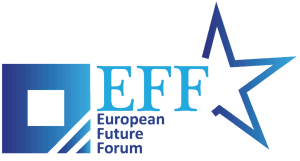
Initiative name: Euro Babble
Location of the European Future Forum (initiator): Vienna, Austria
Description: The EU’s strength is its diversity. But the fact that it has 24 official languages (and many more regional languages and dialects) makes it difficult for Europeans to understand each other and make common decisions.
To not be lost in translation, we launched Euro Babble – an online magazine written for, and by, regular EU citizens. It features in-depth investigative pieces on key under-reported European political and cultural issues. It has become a platform for budding writers of all political backgrounds, experience levels, ages, and nationalities, to share their ideas or local news with the rest of the European community. We hope this encourages mobile EU citizens to get more involved in their host communities!
To overcome the language barriers that usually get in the way of European unity, Euro Babble is available in multiple European languages (currently 8 – EN, FR, ES, DE, NL, PL, IT, and RU).
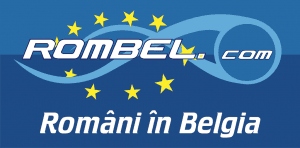
Initiative: A bridge between HOME and nowadays Europe
Location of ROMBEL – Romanian Community in Belgium (initiator): Brussels, Belgium
Description: Lets get to know each other! We celebrate being both Romanian and European citizens, with various activities for better integrating Romanians in the Belgium society.
EU mobility. Identity. Multiculturalism. Social and cultural inclusion. Those are our objectives! Part of our services focus on providing guidelines on administrative procedures, job hunting, taxation and social laws, health, education, arts and culture to newly arrived Romanians. To ease their transition to Brussels, we have also launched the ‘RomBel Dialogues’! Held online, we open up a dialogue on a range of issues important to our expat community. For each session we invite a relevant expert to answer participants’ questions, as well as other Romanian organisations that want to share their related activities. Some recent topics and shared information include:
– Legal advice on compensation entitlements for workers who have been impacted by the Covid-19 crisis
– What does it mean to keep the traditions, the Romanian spirit… what do the Romanians in Belgium need, besides work and bread on the table?
– “Reading Club” for book lovers
– What makes us strong in 2020
Find our more about activities – we invite you to join our community, regardless of nationality! http://www.rombel.com
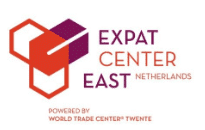
Initiative: Welcome home
Location of the Expat Center East Netherlands (initiator): Hengelo, Netherlands
Description: The Expat Center works closely together with local municipalities and the immigration service to make the first formalities for newly arrived internationals run as smooth as possible. As a central point of information for both internationals and their employers we make sure that questions about practical matters are answered: where can I find a house, is there a good (international) school, how does the local health system work, where can I find a family doctor, how do I arrange my taxes and insurances?? We offer our services in relocation and assist the internationals in finding a house and show them the area, their new home. In our social program we organise a monthly expat meet&greet and a few outings per year.
Visit our website here.
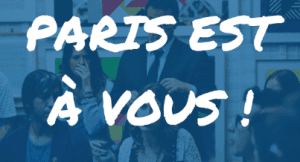
Initiative: INCLUDE
Location of Ville de Paris (Paris City Hall) (initiator): Paris, France
Description: Mobile EU citizens are part of their host societies and should have a say! We launched INCLUDE with two objectives in mind : one aimed at raising awareness about rights granted by EU citizenship to both French nationals and mobile EU Citizens, and one specifically aimed at the political inclusion of mobile EU Citizens. We worked on the first objective by intervening at different public events alongside our partner association, the Jeunes Européens – France, who were in charge of the pedagogic aspects, by creating bilingual communication material on EU rights (9 different sheets on different topics) and organizing more than 40 workshops on various topics linked to EU citizenship.
To encourage the political participation of EU mobile citizens living in Paris, we created a consultative council dedicated to European citizens, representing all of the 28 EU nationalities. Its mission is to enlighten the City Council’s executive branch on the issues linked to EU citizenship and any other topics on which they had expertise.
We also structured an ecosystem of European associations in Paris, may they be associations linked to a certain nationality or associations more broadly advocating for EU citizenship. These associations notably co-drafted and signed a Charter for the Promotion of EU Rights for Associations.
On the specific issue of voting rights of EU citizens, that was quite important due notably to the calendar of INCLUDE (European elections in May 2019 and Local elections in March 2020). We organised for a EU-themed vehicle (the “Trait d’Union”) to drive to different places in Paris and reach out to both French nationals and particularly to mobile EU Citizens to inform them about their voting rights and other rights linked to EU Citizenship. The vehicle was deployed over 30 times over a 1,5 year period
Hop on board and get to know all of our activities in the field! Visit us on Facebook at https://www.facebook.com/ProjetINCLUDE/

Initiative: Calculate your vote!
Location of KohoVolit Civic Association (initiator): Plasy, Czech Republic and Považská Bystrica, Slovakia
Description: The KohoVolit platform collects comprehensive electoral information, organises it more clearly, and presents it in a way that informs rather than overwhelming citizens. To encouraging participation in both national and European Parliament elections, we developed an ‘election calculator’ so that prospective voters can compare how they would vote on key issues and which politicians most closely aligned with those decisions. The quiz is also available in English; we wanted for non-Czech and non-Slovak speakers who live in the two countries to also be informed and take part.

Initiative: 2019 Ballot Tracker
Location of Foundation for the Dutch Abroad (initiator): Netherlands
Description: Home can be many places, but your connection to your country always stays! We must ensure to the best of our ability that all Dutch citizens can vote from abroad, and where the government is failing to address this issue, we take action to do so.
So we launched the ‘Ballot Tracker’! We wanted to get a sense of how many ballots “get lost”, so we set up a map where people could indicate whether their ballot had arrived (in green), had not arrived (in red) or most likely had arrived too late on its way back to the Netherlands to be taking into the counting (in orange). Some of the results were quite surprising.
Once the coronavirus outbreak, which has resulted in a temporary suspension of the freedom of movement in the European Union, subsides, citizens and Member States, EU institutions and civil society will have the task to restore this greatest legacy of European integration. With that goal in mind, the ECAS Awards scheme is being launched for the first time to promote practices and initiatives that aim at fostering inclusion of and provision of information to mobile EU citizens.
Freedom of movement is one of the most cherished achievements of the European integration. There are around 17.5 million EU citizens residing in an EU country other than their own. They decide to move to another EU country for work, studies or to enjoy their retirement. Once they arrive, they often struggle to get their residence documents on time, to find work or to access healthcare. They are also often insufficiently aware of their political rights or face obstacles when they want to make their voices heard in the local or EU elections. Most recently, of course, they share the faith of all Europeans in contributing to the flattening of the COVID-19 curve while often separated from their close ones by closed borders.
The aim of the ECAS Awards is to recognise cities’ and regions’ efforts to overcome those obstacles, enhance freedom of movement in the EU and foster inclusion of mobile EU citizens.
The first edition of the ECAS Awards is piloted under the Mobility and Political Rights Enhancement for EU Citizens (MORE for EU Citizens) project that aims to tackle the challenges experienced by EU mobile citizens, in particular those affecting their rights to family reunification and political participation.
The competition is open to all EU cities and/or regions independently of their size and the number of EU mobile citizens they host.
The initiatives can be submitted under the following categories:
Submitted practices will be assessed by a jury (1st phase) and by mobile EU citizens through a dedicated crowdsourcing platform (2nd phase).
The applications will be evaluated taking into account the following five criteria:
*The last criterion is, of course, not applicable to practices which fall in the category of initiatives mitigating the effects of the COVID-19 crisis.
The best initiative will be announced in December 2020. The winner will be invited to and awarded during the ECAS State of the Union Citizens’ Rights Conference, taking place online on January 21-22, 2021!
For more information, please consult the Rules of Contest available here.
In case you have further enquiries, please contact raia.mihaylova@ecas.org
Once the coronavirus outbreak, which has resulted in a temporary suspension of the freedom of movement in the European Union, subsides, citizens and Member States, EU institutions and civil society will have the task to restore this greatest legacy of European integration. With that goal in mind, the ECAS Awards scheme is being launched for the first time to promote practices and initiatives that aim at fostering inclusion of and provision of information to mobile EU citizens.
Freedom of movement is one of the most cherished achievements of the European integration. There are around 17.5 million EU citizens residing in an EU country other than their own. They decide to move to another EU country for work, studies or to enjoy their retirement. Once they arrive, they often struggle to get their residence documents on time, to find work or to access healthcare. They are also often insufficiently aware of their political rights or face obstacles when they want to make their voices heard in the local or EU elections. Most recently, of course, they share the faith of all Europeans in contributing to the flattening of the COVID-19 curve while often separated from their close ones by closed borders.
The aim of the ECAS Awards is to recognise cities’ and regions’ efforts to overcome those obstacles, enhance freedom of movement in the EU and foster inclusion of mobile EU citizens.
The first edition of the ECAS Awards is piloted under the Mobility and Political Rights Enhancement for EU Citizens (MORE for EU Citizens) project that aims to tackle the challenges experienced by EU mobile citizens, in particular those affecting their rights to family reunification and political participation.
The competition is open to all EU cities and/or regions independently of their size and the number of EU mobile citizens they host.
The initiatives can be submitted under the following categories:
Submitted practices will be assessed by a jury (1st phase) and by mobile EU citizens through a dedicated crowdsourcing platform (2nd phase).
The applications will be evaluated taking into account the following five criteria:
*The last criterion is, of course, not applicable to practices which fall in the category of initiatives mitigating the effects of the COVID-19 crisis.
The best initiative will be announced in December 2020. The winner will be invited to and awarded during the ECAS State of the Union Citizens’ Rights Conference, taking place online on January 21-22, 2021!
For more information, please consult the Rules of Contest available here.
In case you have further enquiries, please contact raia.mihaylova@ecas.org
The contest is open to all EU cities and/or regions/affiliated entities independently of their size and the number of EU mobile citizens they host.
Eligible applicants encompass:
The proposed practice/initiative/activity is expected to directly target/involve/benefit mobile EU citizens and should have commenced within maximum two years before the deadline for applications.
The application form is available at the following link. The deadline for submissions is 23:59 CET on 31 July 2020.
The evaluation of submitted applications will happen in two stages. First, all submitted practices will be assessed by a jury comprised of one representative from: (a) the Council of European Municipalities and Regions, (b) the European Association for Local Democracy (ALDA), and the European Citizen Action Service (ECAS). Second, once the jury has shortlisted 12 best applications (July 2020), mobile EU citizens will be invited to vote for the top three through a dedicated crowdsourcing platform (August-October 2020). The best initiative will be announced in October 2020. The winner will be invited to and awarded during the ECAS Conference in November 2020.
The aim of the ECAS Awards is to recognise cities’ and regions’ efforts to overcome obstacles towards the inclusion of mobile EU citizens and enhance the freedom of movement in the EU. Therefore, the award should stimulate the applicants to continue their efforts and provide transnational visibility to their achievements so that these could serve as an inspiration to others. With these goals in mind, the ECAS Award 2020 will, in addition to the certificate, include:
ECAS AWARDS 2020 – AWARDS FOR THE MOST MOBILE EU CITIZEN-FRIENDLY LOCATION
Are you representing a city or a region that has introduced policies or practices aimed at enhancing freedom of movement or political participation in the EU? Is your city promoting social, cultural or political inclusion of EU mobile citizens?
Apply for the ECAS Award for the most mobile EU citizens-friendly location!
RULES OF CONTEST
Background
Once the coronavirus outbreak which has resulted in a temporary suspension of the freedom of movement in the European Union subsides, citizens and member states, EU institutions and civil society will have the task to restore this greatest legacy of European integration. With that goal in mind, the ECAS Awards scheme is being launched for the first time to promote practices and initiatives that aim at fostering inclusion of and provision of information to mobile EU citizens.
Freedom of movement is one of the most cherished achievements of the European integration. There are around 17.5 million EU citizens residing in an EU country other than their own. They decide to move to another EU country for work, studies or to enjoy their retirement. Once they arrive, they often struggle to get their residence documents on time, to find work or to access healthcare. They are also often insufficiently aware of their political rights or face obstacles when they want to make their voices heard in the local or EU elections. Most recently, of course, they share the faith of all Europeans in contributing to the flattening of the COVID-19 curve while often separated from their close ones by closed borders.
The aim of ECAS Awards is to recognize cities’ and regions’ efforts to overcome those obstacles, enhance freedom of movement in the EU and foster inclusion of mobile EU citizens.
The first edition of the ECAS Awards is piloted under the Mobility and Political Rights Enhancement for EU Citizens (MORE for EU Citizens) project that aims to tackle the challenges experienced by EU mobile citizens, in particular those affecting their rights to family reunification and political participation.
Categories
The proposed practice/initiative/activity can be submitted under the following categories:
Eligibility criteria
The contest is open to all EU cities and/or regions/affiliated entities independently of their size and the number of EU mobile citizens they host.
Eligible applicants encompass:
The proposed practice/initiative/activity is expected to directly target/involve/benefit mobile EU citizens and should have commenced within maximum two years before the deadline for applications.
Award criteria
In the short description section of the application form, the applicant should demonstrate that the proposed practice/initiative/activity tangibly helps achieve the objectives spelled out in the background section of this document. Furthermore, the application should explicitly address the following criteria in the designated section of the application form:
Application submission and deadline
The application form is available at the following link. The deadline for submissions is 23:59 CET on 10 July 2020 – the date commemorating when the Convention on the Future of Europe completed its work on the draft European Constitution, which first contained the rights European citizens are now entitled to in the Lisbon Treaty. Only applications submitted before by the deadline will be considered. Only applications submitted before that will be considered.
Evaluation procedure
The evaluation of submitted applications will take place in two stages. Firstly, all submitted practices will be assessed by a jury comprised of one representative from: (a) the Council of European Municipalities and Regions, (b) the European Association for Local Democracy (ALDA), and the European Citizen Action Service (ECAS). Secondly. once the jury has shortlisted 12 best applications (July 2020), mobile EU citizens will be invited to vote for the top three through a dedicated crowdsourcing platform (August-October 2020). The best initiative will be announced in October 2020. The winner will be invited to and awarded during the ECAS conference in November 2020.
Award
The aim of ECAS Awards is to recognize cities’ and regions’ efforts to overcome obstacles towards the inclusion of mobile EU citizens and enhance the freedom of movement in the EU. Therefore, the award should stimulate the applicants to continue their efforts and provide transnational visibility to their achievements so that these could serve as an inspiration to others. With these goals in mind, the ECAS Award 2020 will, in addition to the certificate include: